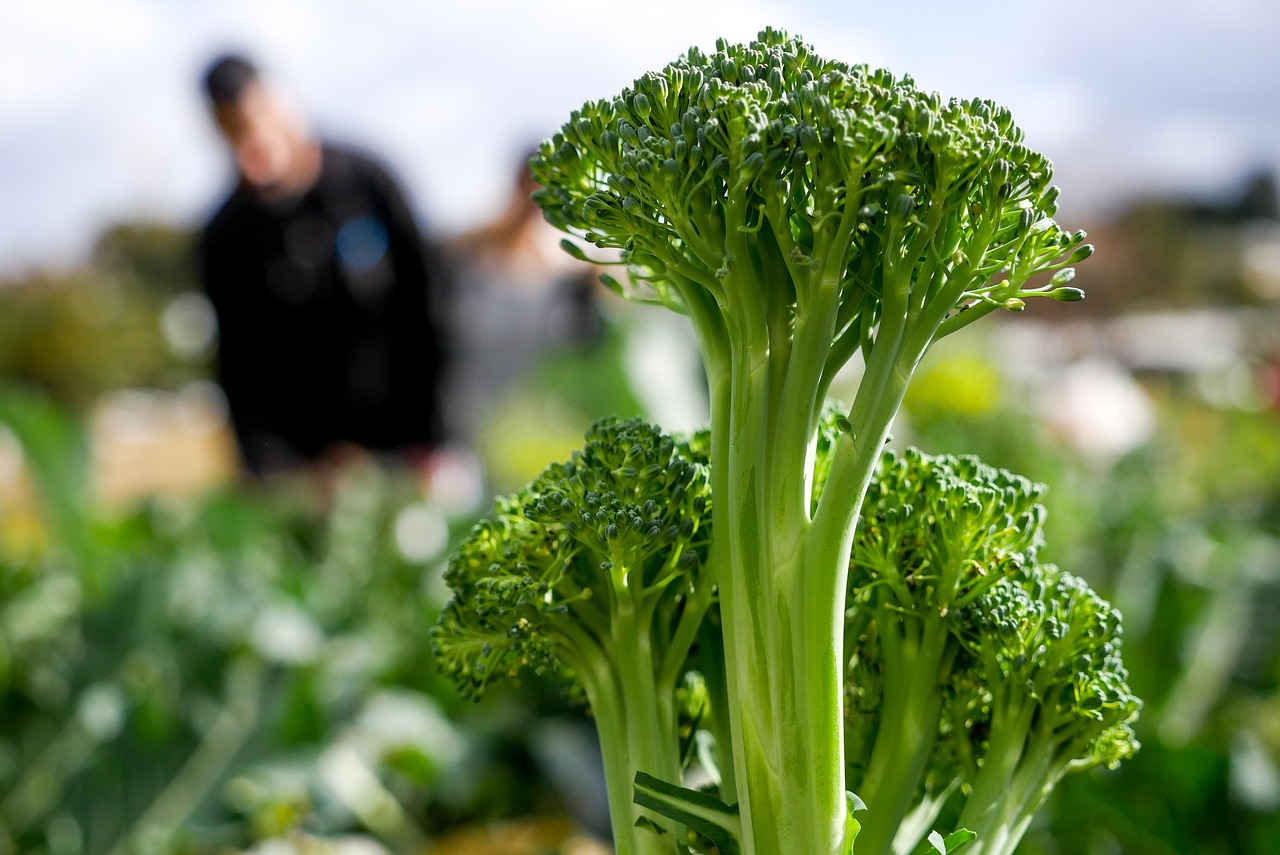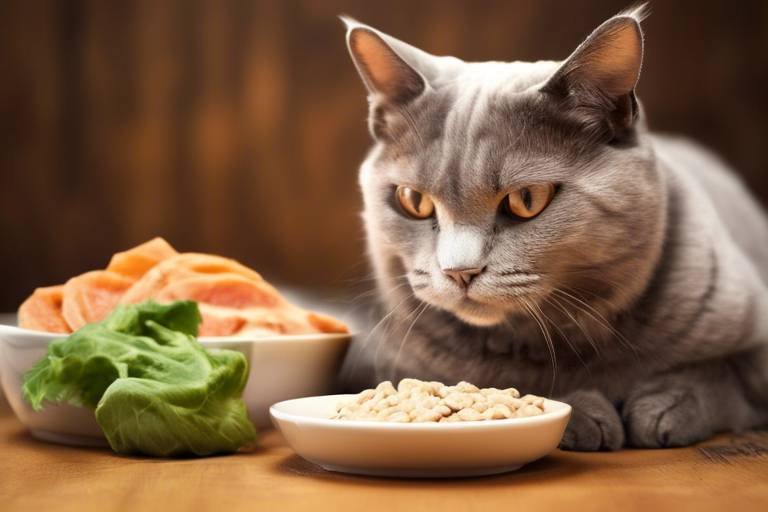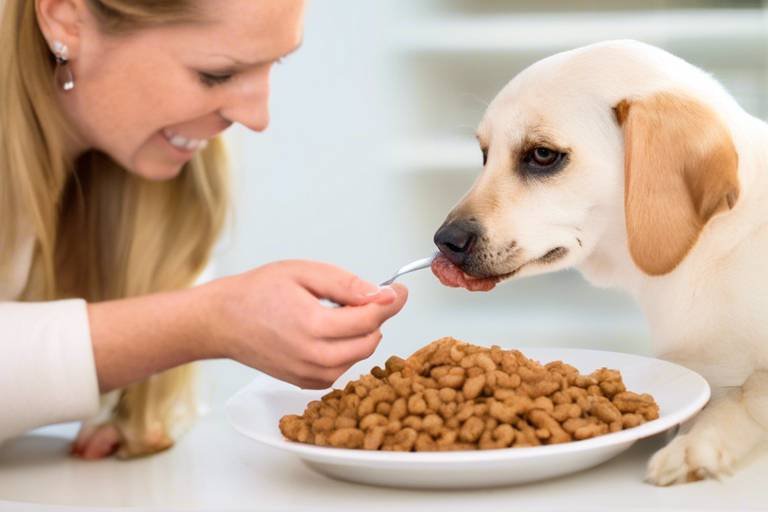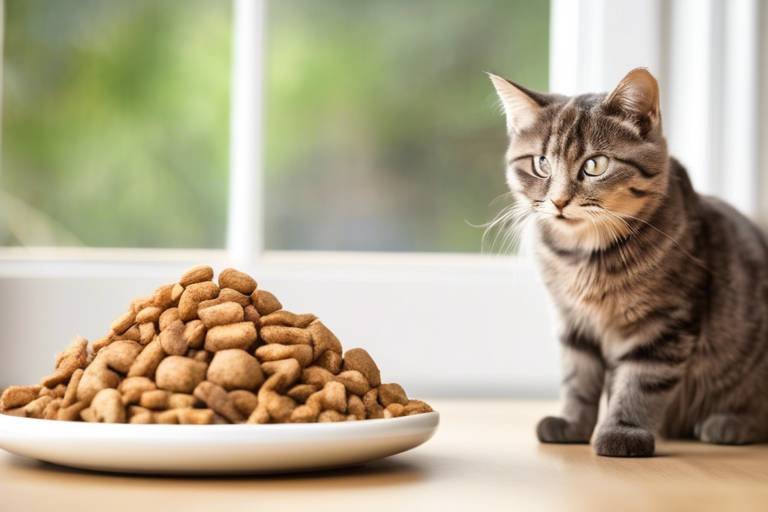Understanding the Benefits of Adding Broccoli to Pet Meals
When it comes to our beloved furry companions, we all want to provide them with the best possible nutrition. Just like humans, pets thrive on a balanced diet, and one surprising yet powerful addition to their meals is broccoli. This vibrant green vegetable is not just a trendy health food for humans; it can also offer a multitude of benefits for pets. Imagine your pet enjoying a tasty meal while simultaneously reaping the rewards of a nutrient-packed ingredient—sounds perfect, right?
Incorporating broccoli into your pet's diet can seem daunting at first, especially if you’re unsure about its benefits or how to prepare it. However, understanding the nutritional advantages of broccoli can enlighten pet owners on making healthier choices for their furry friends. Rich in vitamins, minerals, and antioxidants, broccoli is a powerhouse of nutrition that can contribute positively to your pet's overall health. Think of it as a little green superhero in your pet's bowl, ready to fight off health issues and improve quality of life.
But what exactly makes broccoli so beneficial? For starters, it’s loaded with essential nutrients like vitamins C and K, fiber, and folate. These components are crucial for maintaining a healthy immune system, promoting good digestion, and even supporting bone health. In fact, many pet owners have reported noticeable improvements in their pets' vitality and energy levels after adding this vegetable to their meals. Just like a well-balanced diet can transform our health, the same principle applies to our pets.
However, it’s essential to approach this new addition with care. While broccoli can be a fantastic supplement, it’s vital to understand how to prepare it correctly and how much to serve. Overloading your pet’s diet with broccoli can lead to gastrointestinal issues, which is the last thing any pet owner wants. Moderation is key, and introducing this green goodness slowly can help you gauge your pet's reaction and tolerance.
In the following sections, we will dive deeper into the specific nutritional value of broccoli, the various health benefits it offers, and practical tips on how to prepare and serve it safely. By the end of this article, you’ll be well-equipped to make informed decisions about adding broccoli to your pet's meals, ensuring they enjoy both the taste and health benefits of this remarkable vegetable. So, let’s get started on this green journey together!
Broccoli is not just a pretty vegetable; it’s a nutritional powerhouse! Packed with a variety of vitamins and minerals, it can significantly enhance your pet's diet. Here’s a quick rundown of what makes broccoli so special:
| Nutrient | Benefits |
|---|---|
| Vitamin C | Boosts the immune system and promotes healthy skin. |
| Vitamin K | Supports bone health and helps with blood clotting. |
| Fiber | Promotes healthy digestion and can help prevent constipation. |
| Folate | Essential for cell growth and metabolism. |
| Antioxidants | Combat oxidative stress and may reduce the risk of chronic diseases. |
As you can see, the nutritional value of broccoli is impressive, making it a worthy addition to your pet's meals. But let’s not stop here; let’s explore the health benefits that come along with this vibrant vegetable!
Adding broccoli to your pet's diet can unlock a treasure trove of health benefits. From improved digestion to enhanced immune function, this vegetable can positively impact your pet's overall well-being. Here are some key benefits:
Broccoli is rich in antioxidants, which play a crucial role in combating oxidative stress in pets. Just like us, pets are exposed to environmental toxins and stressors that can lead to health issues over time. Antioxidants help neutralize these free radicals, contributing to a longer, healthier life for your furry friend. Think of antioxidants as the shield protecting your pet from the wear and tear of daily life.
Chronic inflammation can be a silent enemy for pets, leading to various health conditions. The anti-inflammatory properties of broccoli can help alleviate these issues, especially for older pets suffering from joint pain. By reducing inflammation, broccoli can improve your pet’s mobility and overall comfort, allowing them to enjoy life to the fullest.
A robust immune system is vital for pets, and broccoli can play a significant role in enhancing immune responses. By including this green vegetable in their diet, you can help keep your pet healthy and resilient against common illnesses. Just like a strong fortress protects against invaders, a strong immune system safeguards your pet's health.
With all these benefits, it’s clear that broccoli can be a game-changer for your pet’s diet. However, it’s essential to prepare it correctly and be mindful of potential risks. Let's explore how to prepare broccoli for your pets in the next section!
- Can all pets eat broccoli? - Most pets can safely consume broccoli, but it's always best to consult your veterinarian before introducing new foods.
- How should I serve broccoli to my pet? - Steamed or boiled broccoli is often the best option, as it retains most of its nutrients while being easier to digest.
- What if my pet doesn’t like broccoli? - Try mixing it with their favorite foods or experimenting with different preparation methods to make it more appealing.

Nutritional Value of Broccoli
This article explores the nutritional advantages of incorporating broccoli into your pet's diet, highlighting its health benefits, preparation methods, and potential risks to ensure a balanced and safe feeding experience for your furry friends.
Broccoli is often hailed as a superfood for humans, but did you know it can also be a fantastic addition to your pet's diet? This vibrant green vegetable is packed with an impressive array of vitamins, minerals, and antioxidants that can significantly enhance your furry friend's health. Let's dive into the specific nutrients that make broccoli a nutritional powerhouse.
First off, broccoli is rich in vitamin C, which is crucial for maintaining a healthy immune system. Just like us, pets need this vitamin to fight off infections and diseases. Additionally, it contains vitamin K, which plays a vital role in blood clotting and bone health. For pets, especially older dogs and cats, strong bones are essential to maintain mobility and overall quality of life.
Broccoli is also a good source of fiber, which aids in digestion. A fiber-rich diet can help prevent constipation and promote a healthy gut, making your pet feel comfortable and energetic. Furthermore, the high fiber content can assist in weight management, as it helps pets feel full without adding excessive calories.
Another notable nutrient found in broccoli is folate, which is essential for cell growth and metabolism. Folate helps in the production of red blood cells, ensuring that your pet has enough oxygen circulating throughout their body. This is particularly important for active pets who need a steady supply of energy.
Moreover, broccoli contains potassium, which is crucial for maintaining proper muscle and nerve function. It helps regulate fluid balance and can prevent issues such as dehydration, especially in pets that are active or live in hot climates.
To summarize the nutritional value of broccoli, here’s a handy table:
| Nutrient | Benefits |
|---|---|
| Vitamin C | Boosts immune function |
| Vitamin K | Supports bone health |
| Fiber | Aids digestion and weight management |
| Folate | Essential for cell growth and metabolism |
| Potassium | Regulates muscle and nerve function |
Incorporating broccoli into your pet’s diet not only provides these essential nutrients but also contributes to their overall well-being. However, as with any new food, it's important to introduce it gradually to see how your pet reacts. Remember, a balanced diet is the key to a happy and healthy pet!
Adding broccoli to pet meals can offer numerous health benefits, such as improved digestion and enhanced immune function. This section discusses how these benefits can positively impact your pet's overall well-being.
Broccoli contains antioxidants that can combat oxidative stress in pets. This subsection explains how antioxidants contribute to longevity and better health in animals.
The anti-inflammatory properties of broccoli can help alleviate chronic conditions in pets. Here, we delve into how this vegetable aids in reducing inflammation and improving joint health.
A strong immune system is vital for pets, and broccoli plays a role in enhancing immune responses. This section outlines how including broccoli can help keep your pet healthy and resilient.
Fiber-rich foods like broccoli promote healthy digestion in pets. This subsection highlights the importance of fiber and how it can prevent digestive issues in animals.
Proper preparation is crucial to ensure that broccoli is safe and enjoyable for pets. This section provides tips on how to cook and serve broccoli to maximize its benefits.
Different cooking methods can affect the nutritional value of broccoli. Here, we discuss the best ways to prepare broccoli for pets, including steaming and boiling.
Incorporating broccoli into pet meals can be creative and fun. This subsection offers serving ideas and recipes to make broccoli an appealing addition to your pet's diet.
While broccoli has many benefits, there are also potential risks to consider. This section addresses the precautions pet owners should take when adding broccoli to their pets' meals.
Feeding pets too much broccoli can lead to gastrointestinal upset. Here, we discuss the importance of moderation and how to determine the right amount for your pet.
Some pets may have allergies or sensitivities to broccoli. This subsection highlights signs of allergic reactions and what pet owners should watch for when introducing new foods.
Here are some common questions pet owners might have about adding broccoli to their pets' diets:
- Can all pets eat broccoli? Most pets can safely eat broccoli, but it’s best to consult your veterinarian first.
- How should I introduce broccoli to my pet? Start with small amounts and monitor for any adverse reactions.
- Is raw broccoli safe for pets? While raw broccoli is safe, cooking it can make it easier for pets to digest.

Health Benefits for Pets
When it comes to our furry friends, we all want to ensure they lead happy and healthy lives. One of the simplest ways to boost their well-being is by incorporating broccoli into their diet. This vibrant green vegetable is not just a human favorite; it offers a plethora of health benefits for pets as well. From enhancing digestion to boosting immunity, broccoli can be a game-changer in your pet's nutritional regime.
One of the standout features of broccoli is its rich content of vitamins and minerals. It's loaded with Vitamin C, Vitamin K, and a variety of B vitamins, which are essential for maintaining your pet's overall health. These nutrients play a critical role in supporting various bodily functions, from cell repair to immune system support. When you think about it, feeding your pet broccoli is like giving them a little boost of nature's best medicine!
Moreover, the high fiber content in broccoli promotes healthy digestion. Just like humans, pets need fiber to keep their digestive systems running smoothly. Fiber helps to prevent constipation and can even aid in weight management by making pets feel fuller for longer. Imagine broccoli as a tiny broom sweeping through your pet's intestines, keeping everything clean and functioning optimally.
But that's not all! Broccoli is also known for its antioxidant properties. These antioxidants help combat oxidative stress, which can lead to chronic diseases in pets. By including broccoli in their meals, you’re essentially providing your pets with a shield against harmful free radicals. Think of it as a superhero cape that protects them from the inside out, promoting longevity and better health.
In addition to its antioxidant benefits, broccoli has impressive anti-inflammatory properties. Chronic inflammation can lead to various health issues, including arthritis and heart disease. By incorporating broccoli into your pet's diet, you may help alleviate some of these conditions, improving their quality of life. Imagine your pet moving around with ease, playing fetch without discomfort—broccoli can be a part of that transformation!
Lastly, let’s not forget about the immune-boosting capabilities of broccoli. A strong immune system is vital for pets to fend off illnesses. The nutrients found in broccoli, particularly its high levels of vitamins and minerals, can enhance your pet's immune responses, making them more resilient against infections. It’s like giving them a little armor to protect them from the world!
In summary, adding broccoli to your pet's meals can provide numerous health benefits, including:
- Improved digestion
- Enhanced immune function
- Anti-inflammatory effects
- Rich in antioxidants
So, why not give your furry friend a taste of this nutritious vegetable? With all these benefits, you’ll be doing them a favor while also enjoying the joy of watching them thrive!
Antioxidant Properties
When it comes to keeping our furry friends healthy, antioxidants play a crucial role, and broccoli is a fantastic source of these powerful compounds. Antioxidants are like little warriors that fight against the damage caused by free radicals in the body. These free radicals can come from various sources, such as pollution, stress, and even the food our pets consume. By including broccoli in your pet's diet, you can help combat oxidative stress, which is known to contribute to various health issues, including aging and chronic diseases.
What makes broccoli particularly special is its rich content of vitamins C and E, both of which are potent antioxidants. Vitamin C helps neutralize free radicals, while vitamin E works to protect cell membranes from oxidative damage. Together, they form a dynamic duo that can enhance your pet's overall health and longevity. Just imagine how these nutrients work together to help your pet feel more energetic and vibrant!
Research has shown that antioxidants can significantly improve the quality of life for pets by:
- Reducing the risk of chronic diseases
- Slowing down the aging process
- Enhancing skin and coat health
- Boosting energy levels and vitality
Incorporating broccoli into your pet's meals is like giving them a natural shield against the wear and tear of everyday life. Just think of it as a superhero cape for your pet's cells! However, it's essential to remember that while antioxidants are beneficial, they work best when included as part of a balanced diet. So, be sure to mix it up with other fruits and vegetables to provide a comprehensive range of nutrients.
To sum it up, the antioxidant properties of broccoli not only help in fighting off harmful free radicals but also contribute to your pet's overall health and well-being. By adding this vibrant green vegetable to their meals, you're not just treating them to something tasty; you're also investing in their long-term health. It's a win-win situation that every pet owner should consider!
Q: Can all pets eat broccoli?
A: While most pets can enjoy broccoli in moderation, it's always best to consult with your veterinarian, especially if your pet has any specific health concerns or dietary restrictions.
Q: How much broccoli can I give my pet?
A: Moderation is key! A small amount, about 10% of your pet's daily food intake, is a good starting point. Monitor your pet for any digestive upset and adjust accordingly.
Q: What are the signs of an allergic reaction to broccoli?
A: Signs may include itching, swelling, vomiting, or diarrhea. If you notice any of these symptoms after introducing broccoli, discontinue feeding it and consult your vet.
Q: Is cooked or raw broccoli better for pets?
A: Lightly steaming broccoli can help retain its nutrients while making it easier for pets to digest. Raw broccoli can be given in small amounts, but always ensure it's chopped into manageable pieces to prevent choking.
Reducing Inflammation
When it comes to our beloved pets, inflammation can be a silent enemy, lurking beneath the surface and causing discomfort and pain. Just like humans, our furry friends can suffer from various inflammatory conditions, such as arthritis, allergies, and skin irritations. This is where broccoli steps into the spotlight as a natural ally. Packed with powerful anti-inflammatory compounds, broccoli can help in reducing inflammation and improving your pet's overall quality of life.
One of the key players in broccoli's anti-inflammatory arsenal is a compound called sulforaphane. This potent antioxidant has been shown to inhibit the production of inflammatory chemicals in the body, which can lead to chronic pain and discomfort. By incorporating broccoli into your pet's diet, you are essentially providing them with a natural defense against these harmful processes. It's like giving them a shield to protect them from the wear and tear of everyday life!
Moreover, broccoli is rich in omega-3 fatty acids, known for their anti-inflammatory properties. These fatty acids can help alleviate joint pain, making them particularly beneficial for older pets or those with existing inflammatory conditions. Think of omega-3s as the soothing balm that calms the storm of inflammation raging within your pet's body.
To maximize the anti-inflammatory benefits of broccoli, consider the following tips:
- Cook it lightly: Steaming or lightly boiling broccoli can help preserve its nutrients while making it easier for your pet to digest.
- Mix it up: Combine broccoli with other anti-inflammatory foods, such as sweet potatoes or carrots, to create a delicious and nutritious meal.
- Monitor their response: Pay attention to how your pet reacts after introducing broccoli. If you notice any signs of discomfort, consult your veterinarian.
Incorporating broccoli into your pet's meals is not just a trendy health tip; it's a practical way to combat inflammation and promote overall well-being. Remember, a happy pet is a healthy pet, and with broccoli as part of their diet, you're giving them the tools they need to thrive. So why not give it a try? Your furry friend will thank you for it!
Q: Can all pets eat broccoli?
A: While most pets can safely enjoy broccoli, it's important to introduce it gradually and monitor for any adverse reactions. Some pets may have sensitivities or allergies.
Q: How much broccoli should I give my pet?
A: Moderation is key! Start with small amounts, such as a few florets for dogs or a small piece for cats, and adjust based on your pet's size and tolerance.
Q: Are there any risks associated with feeding broccoli to pets?
A: Yes, feeding too much broccoli can lead to gastrointestinal upset. Always consult your veterinarian if you're unsure about your pet's diet.
Boosting Immunity
When it comes to keeping our furry friends healthy, a strong immune system is essential. Just like humans, pets need a robust defense mechanism to fight off illnesses and infections. One of the standout features of broccoli is its ability to boost immunity in pets. This green vegetable is loaded with vital nutrients that work together to enhance the immune response. For instance, broccoli is rich in vitamins C and K, both of which play crucial roles in maintaining a healthy immune system.
Vitamin C is a powerful antioxidant that helps to neutralize free radicals in the body, reducing oxidative stress. This is particularly important for pets, as oxidative stress can lead to various health issues, including chronic diseases. Additionally, vitamin K supports overall health by aiding in blood clotting and promoting strong bones. When combined, these vitamins create a formidable defense against pathogens.
Moreover, broccoli contains sulforaphane, a compound known for its anti-cancer properties. This compound not only helps to detoxify the body but also enhances the body’s ability to fight off cancerous cells. By incorporating broccoli into your pet’s diet, you’re not just providing a tasty treat; you’re also giving them a natural way to strengthen their immune system.
It's also worth noting that broccoli is a source of fiber, which is essential for digestive health. A healthy gut plays a vital role in immunity. When the digestive system is functioning well, it can efficiently absorb nutrients and support the immune system. Therefore, feeding your pet broccoli not only boosts their immunity directly but also indirectly by promoting a healthy gut.
So, how can you make broccoli a part of your pet's diet? Here are some simple tips:
- Start with small amounts to see how your pet reacts.
- Mix it into their regular food for added nutrition.
- Consider making homemade treats that include broccoli.
In conclusion, adding broccoli to your pet’s meals is a simple yet effective way to enhance their immune function. By doing so, you're investing in their long-term health and well-being. Just remember, moderation is key, and always consult your veterinarian before making significant changes to your pet's diet.
Q: Can all pets eat broccoli?
A: While most dogs and cats can safely enjoy broccoli, it's essential to introduce it gradually and monitor for any adverse reactions. Always consult your vet if you're unsure.
Q: How much broccoli can I give my pet?
A: Moderation is crucial. A few small pieces mixed into their meals a couple of times a week is a good start. Too much can lead to digestive upset.
Q: Are there any risks associated with feeding broccoli to pets?
A: Yes, some pets may experience gastrointestinal issues if they consume too much broccoli. Additionally, allergic reactions are possible, so watch for signs of discomfort.
Q: What is the best way to prepare broccoli for my pet?
A: Steaming or lightly boiling broccoli is often recommended, as these methods can help retain its nutrients while making it easier for pets to digest.
Digestive Health
When it comes to our furry companions, digestive health is a cornerstone of their overall well-being. Just like us, pets can experience a range of digestive issues, from constipation to diarrhea, which can significantly affect their mood and energy levels. Incorporating broccoli into your pet's diet can be a game-changer in promoting a healthy digestive system. This vibrant green vegetable is rich in fiber, which is essential for maintaining regular bowel movements and preventing gastrointestinal problems.
Fiber acts like a broom, sweeping through the intestines and helping to clear out waste. When pets consume fiber-rich foods like broccoli, they may experience improved digestion, which can lead to better nutrient absorption and overall health. Moreover, fiber can help balance the gut microbiome, supporting the growth of beneficial bacteria that are crucial for digestion. A healthy gut means a happy pet!
But how much broccoli should you include in your pet's meals? While it’s packed with nutrients, moderation is key. Too much fiber at once can lead to digestive upset, causing gas or bloating. It's always a good idea to introduce broccoli gradually into your pet's diet. Start with small amounts and observe how your pet reacts. Here’s a quick guideline:
| Pet Size | Recommended Amount of Broccoli |
|---|---|
| Small (up to 20 lbs) | 1-2 small florets |
| Medium (20-50 lbs) | 2-4 small florets |
| Large (50+ lbs) | 4-6 small florets |
In addition to fiber, broccoli also contains important nutrients like vitamins A, C, and K, which contribute to a healthy digestive tract. Vitamin C, for instance, is known for its antioxidant properties, helping to reduce inflammation in the gut. This is particularly beneficial for pets that may suffer from chronic digestive issues.
But let’s not forget about hydration! While broccoli is nutritious, it’s essential to ensure your pet is drinking enough water, especially when increasing fiber intake. Water helps to soften the stool and aids in digestion, making it easier for your pet to pass waste. So, keep that water bowl full and fresh!
In conclusion, adding broccoli to your pet's diet can significantly enhance their digestive health. By providing the right amount and ensuring they stay hydrated, you can help your furry friend enjoy all the benefits of this superfood. Remember, a happy gut often leads to a happy pet!
- Can all pets eat broccoli? Most pets can enjoy broccoli, but it's always best to consult your veterinarian, especially if your pet has existing health conditions.
- What are the signs of digestive issues in pets? Look for symptoms like vomiting, diarrhea, lack of appetite, or changes in behavior. If you notice any of these, consult your vet.
- How should I introduce broccoli to my pet's diet? Start with small amounts and gradually increase it while monitoring your pet's reaction.

How to Prepare Broccoli for Pets
Preparing broccoli for your furry friends is not just about tossing it in their bowl; it’s about ensuring they get the most out of this nutritious vegetable while also enjoying it! First things first, you want to make sure that the broccoli is fresh. Look for firm, vibrant green florets without any yellowing or wilting. Once you've selected the best broccoli, the next step is to wash it thoroughly to remove any pesticides or dirt that might linger on the surface. This is crucial because we want our pets to enjoy broccoli without any harmful chemicals.
Now, when it comes to cooking, steaming is often considered the best method. Why? Because steaming helps retain most of the nutrients that are beneficial for your pet. When you steam broccoli, you are essentially allowing it to cook just enough to soften it, making it easier for your pet to digest. Boiling is another option, but be cautious as it can lead to some nutrient loss. If you choose to boil, make sure to use minimal water and keep the cooking time short. An ideal steaming time is about 3-5 minutes, just enough to make it tender yet still crunchy.
After cooking, let the broccoli cool down before serving it to your pet. You can chop it into small, manageable pieces to prevent choking, especially for smaller animals. Remember, presentation matters! Pets can be picky eaters, so mixing chopped broccoli with their regular food can make it more appealing. You can even mash it up and mix it with some of their favorite wet food. This not only enhances the flavor but also ensures that they are getting all the nutritional value broccoli has to offer.
Here’s a quick overview of the best methods to prepare broccoli for your pets:
| Method | Description | Nutrient Retention |
|---|---|---|
| Steaming | Cook broccoli in a steamer for 3-5 minutes. | High |
| Boiling | Boil broccoli for a short time, using minimal water. | Moderate |
Another fun way to serve broccoli is to make it a part of a homemade treat! You can blend cooked broccoli with some oats and a bit of peanut butter (ensure it's xylitol-free) to create a delightful snack that your pet will love. Just remember to introduce any new food gradually to avoid any digestive issues.
In summary, preparing broccoli for your pet is a straightforward process that can yield great health benefits. Just remember to cook it properly, serve it in a way that appeals to your pet, and keep an eye on their reactions to this new addition to their diet. With a little creativity, you can turn a simple vegetable into a tasty and nutritious treat that your furry friend will enjoy!
Cooking Methods
When it comes to preparing broccoli for your pets, the cooking method you choose can significantly affect its nutritional value and digestibility. While raw broccoli is safe for pets, cooking it can enhance its palatability and make it easier for your furry friends to digest. Here are some of the most effective cooking methods:
- Steaming: This is perhaps the best method for cooking broccoli. Steaming helps retain most of the vegetable's nutrients while softening its texture, making it more appealing to pets. Just steam until tender but still vibrant green, which usually takes about 5-7 minutes.
- Boiling: Boiling is another option, but it can lead to some nutrient loss. If you opt for this method, ensure you don't overcook the broccoli. A quick boil for about 3-4 minutes is often sufficient. After boiling, consider saving the water to use in soups or other dishes, as it may contain some of the nutrients that leached out during cooking.
- Microwaving: If you're short on time, microwaving is a quick and effective way to cook broccoli. Place the florets in a microwave-safe dish with a little water, cover it, and microwave for 2-3 minutes. This method can preserve nutrients while also making the broccoli soft enough for your pet to enjoy.
Regardless of the cooking method you choose, it's essential to let the broccoli cool down before serving it to your pet. Hot food can burn their mouths, leading to discomfort and a negative association with the food. Once cooled, you can chop the broccoli into smaller pieces to make it easier for your pet to chew and digest.
Additionally, you can get creative with how you serve broccoli to your pets. Mixing it with their regular food or incorporating it into homemade pet treats can make the vegetable more enticing. Remember, the goal is to make the meal enjoyable while still providing the health benefits that broccoli offers!
1. Can I feed my pet raw broccoli?
Yes, raw broccoli is safe for pets, but some may find it harder to digest. Cooking it can make it easier for them to enjoy.
2. How much broccoli can I give my pet?
Moderation is key! Generally, broccoli should only make up about 10% of your pet's diet to avoid any gastrointestinal upset.
3. Are there any pets that shouldn't eat broccoli?
While most pets can enjoy broccoli, certain animals with specific dietary restrictions or allergies may need to avoid it. Always consult your veterinarian if you're unsure.
4. What are the signs of an allergic reaction to broccoli?
Watch for symptoms such as vomiting, diarrhea, or excessive itching. If you notice any of these signs after introducing broccoli, discontinue feeding it and consult your vet.
5. Can I mix broccoli with other vegetables?
Absolutely! Mixing broccoli with other pet-safe vegetables like carrots or green beans can provide a variety of nutrients and keep mealtime interesting for your pet.
Serving Suggestions
Incorporating broccoli into your pet's meals can be both a nutritious and enjoyable experience for them. The key is to make it appealing and easy for your furry friend to digest. One of the simplest ways to serve broccoli is by steaming it until it's tender but still vibrant green. This method helps retain most of the essential nutrients while making it easier for your pet to chew and digest. Once steamed, you can chop the broccoli into small, bite-sized pieces, which can be mixed into their regular food.
Another fun idea is to create a broccoli puree. Simply blend cooked broccoli with a little water or low-sodium broth until smooth. This puree can be drizzled over your pet's dry kibble, adding moisture and flavor that encourages even the pickiest eaters to dig in. Plus, it can be a great way to sneak in some extra veggies!
If your pet enjoys treats, consider making broccoli treats. Combine finely chopped broccoli with whole wheat flour, eggs, and some peanut butter to create a dough. Roll it out, cut it into shapes, and bake until golden. Not only will your pet love these treats, but you'll also feel good knowing they're getting a healthy snack.
For a more elaborate meal, you can create a broccoli and chicken stir-fry. Cook diced chicken breast in a pan, add steamed broccoli, and toss everything together with a splash of low-sodium chicken broth. This dish is not only nutritious but also packed with flavor, making it a delightful mealtime option for your pet.
Lastly, don’t forget to experiment! Mixing broccoli with other pet-safe vegetables like carrots, peas, or sweet potatoes can create a colorful and nutritious medley. Always ensure that any new additions are safe for your pet and introduce them gradually to avoid any digestive upset.
Q1: Can all pets eat broccoli?
A1: While most dogs and cats can safely eat broccoli in moderation, it's important to introduce it slowly and monitor for any adverse reactions. Some pets may have sensitivities, so always consult with your veterinarian first.
Q2: How much broccoli can I give my pet?
A2: Moderation is key! A few small pieces a few times a week is generally a safe amount for most pets. Too much broccoli can lead to gastrointestinal upset.
Q3: What if my pet doesn’t like broccoli?
A3: If your pet is not a fan of broccoli, try mixing it with their favorite foods or using it in recipes like treats or purees. Sometimes, a little creativity can make all the difference!
Q4: Are there any pets that should avoid broccoli?
A4: Pets with certain medical conditions, particularly those involving the thyroid or gastrointestinal issues, may need to avoid broccoli. Always check with your vet if you're unsure.

Potential Risks and Considerations
While broccoli is undoubtedly a nutritional powerhouse for our furry companions, it’s crucial for pet owners to be aware of the potential risks and considerations when adding this green vegetable to their pets' meals. Just like with any new food, moderation and observation are key to ensuring a safe and healthy diet. Overindulgence in broccoli can lead to gastrointestinal upset in pets, causing discomfort and distress. Therefore, it's essential to introduce broccoli gradually and monitor your pet for any adverse reactions.
One of the primary concerns with feeding broccoli to pets is the risk of gastrointestinal issues. Too much broccoli can lead to bloating, gas, or even diarrhea. To prevent these issues, it’s advisable to start with small amounts and observe how your pet reacts. If you notice any signs of discomfort, it may be best to reduce the serving size or discontinue feeding broccoli altogether. Remember, every pet is unique, and what works for one may not work for another.
Another consideration is the possibility of allergic reactions. Although rare, some pets may exhibit sensitivities to broccoli. Signs of an allergic reaction can include itching, swelling, or gastrointestinal upset. If you suspect your pet might be allergic, it's essential to consult with your veterinarian before introducing broccoli into their diet. Keeping a close eye on your pet during the initial feeding days can be beneficial in identifying any potential allergies early on.
Here's a quick overview of the potential risks associated with feeding broccoli to pets:
- Gastrointestinal Upset: Overfeeding can lead to gas, bloating, or diarrhea.
- Allergic Reactions: Some pets may have allergies or sensitivities to broccoli.
- Oxalate Content: Broccoli contains oxalates, which can interfere with calcium absorption in high amounts.
In conclusion, while broccoli can be a beneficial addition to your pet's diet, it is essential to approach its introduction with caution. Always consult with your veterinarian if you have any concerns or questions about your pet's diet, especially when incorporating new foods. By keeping these potential risks in mind, you can ensure that your furry friend enjoys the health benefits of broccoli without any adverse effects.
1. Can all pets eat broccoli?
Yes, most pets can eat broccoli, but it's essential to introduce it gradually and monitor for any adverse reactions. Always consult your veterinarian if unsure.
2. How much broccoli can I safely feed my pet?
Moderation is key. Start with small pieces (about a teaspoon for small pets and a tablespoon for larger pets) and adjust based on their tolerance.
3. Should broccoli be cooked before feeding it to my pet?
Cooking broccoli can make it easier for pets to digest. Steaming is a recommended method as it preserves most of the nutrients.
4. What are the signs of an allergic reaction to broccoli?
Signs may include itching, swelling, vomiting, or diarrhea. If you observe any of these symptoms, discontinue feeding broccoli and consult your veterinarian.
5. Can broccoli help with my pet's health?
Yes, broccoli is rich in vitamins, minerals, and antioxidants, which can contribute to better digestion, improved immunity, and overall health when fed in moderation.
Moderation is Key
When it comes to adding broccoli to your pet's diet, moderation is essential. While this green powerhouse is packed with nutrients, feeding your furry friend too much of it can lead to some unpleasant gastrointestinal issues. Imagine giving your pet a feast of broccoli; it might seem like a healthy choice, but just like us humans, pets can overindulge and experience discomfort. So, how do we strike the right balance?
First and foremost, it's crucial to understand that every pet is unique. Factors such as size, breed, and individual health conditions play a significant role in determining how much broccoli is appropriate. For example, a small dog may only need a couple of florets, while a larger breed could handle a bit more. As a general rule of thumb, broccoli should make up no more than 10% of your pet's total diet. This ensures they receive the benefits without overwhelming their digestive system.
To help you gauge the right amount, consider the following guidelines:
- Small Dogs: 1-2 florets per serving
- Medium Dogs: 2-4 florets per serving
- Large Dogs: 4-6 florets per serving
- Cats: 1-2 florets per serving
It's also important to introduce broccoli gradually into your pet's diet. Start with a small amount and observe how they respond. If you notice any signs of gastrointestinal upset, such as gas, bloating, or diarrhea, it might be a sign that you've gone a bit overboard. In that case, it's best to cut back and consult your veterinarian if issues persist.
Remember, moderation is not just about quantity; it's also about variety. While broccoli is a fantastic addition to your pet's meals, it shouldn't be the only vegetable they consume. Mixing in other safe vegetables like carrots, peas, or green beans can create a more balanced diet and prevent your pet from getting bored with their meals. Think of it as a colorful plate of health, where each vegetable adds its unique flavor and nutrients!
In summary, while broccoli can be a wonderful, nutritious treat for your pets, keeping it in moderation is key to ensuring their health and happiness. Always monitor their reactions to new foods and consult with your vet if you're unsure about the right amounts. After all, a happy pet is a healthy pet!
- Can I feed my dog raw broccoli? Yes, but it's often better to steam it first to make it easier for them to digest.
- What are the signs my pet is having a reaction to broccoli? Look for symptoms like vomiting, diarrhea, or excessive gas.
- Is broccoli safe for all pets? While most dogs and cats can enjoy broccoli, it's always best to consult your vet, especially if your pet has pre-existing health conditions.
- How can I make broccoli more appealing to my pet? Try mixing it with their favorite foods or incorporating it into homemade treats!
Allergic Reactions
When it comes to introducing new foods into your pet's diet, are a serious consideration. Just like humans, pets can develop sensitivities or allergies to certain ingredients, including broccoli. While this green vegetable is generally safe and beneficial for most dogs and cats, it’s crucial to be vigilant and observant when adding it to their meals. Allergic reactions can manifest in various ways, and recognizing the signs early can help prevent more severe health issues.
Common symptoms of an allergic reaction in pets may include:
- Itching or scratching: If your pet starts scratching more than usual, it could indicate an allergic response.
- Skin irritations: Look for rashes, redness, or hives on your pet's skin.
- Gastrointestinal upset: Symptoms such as vomiting or diarrhea can occur if your pet's stomach doesn't agree with broccoli.
- Swelling: Pay attention to any swelling around the face, ears, or paws, which can be a sign of a serious allergic reaction.
To minimize the risk of allergies, it’s best to introduce broccoli gradually into your pet’s diet. Start with a small amount and monitor your pet closely for any adverse reactions. If you notice any of the symptoms mentioned above, it’s essential to consult your veterinarian promptly. They can provide guidance on whether to continue feeding broccoli or explore alternative vegetables that might be more suitable for your furry friend.
Additionally, keep in mind that some pets may have pre-existing conditions or sensitivities that make them more prone to allergic reactions. Always consider your pet's unique health profile when introducing new foods. If your pet has a history of food allergies, it might be wise to consult with your vet before adding broccoli or any new ingredient to their meals.
Frequently Asked Questions
- Can I feed my pet broccoli every day?
While broccoli is nutritious, it's important to feed it in moderation. Too much can cause gastrointestinal upset, so consider offering it a few times a week instead of daily.
- How should I prepare broccoli for my pet?
The best way to prepare broccoli for pets is by steaming or boiling it. These methods help retain its nutrients while making it easier for your pet to digest. Always ensure it's cooled down before serving!
- What are the signs of an allergic reaction in pets?
Watch for symptoms like itching, swelling, or gastrointestinal distress such as vomiting or diarrhea. If you notice any of these signs after introducing broccoli, consult your veterinarian immediately.
- Is broccoli safe for all pets?
Most pets can safely enjoy broccoli, but some animals may have specific allergies or sensitivities. It's always a good idea to introduce new foods gradually and monitor your pet's reaction.
- What health benefits does broccoli provide for pets?
Broccoli is packed with vitamins, minerals, and antioxidants that can boost your pet's immune system, improve digestion, and even help reduce inflammation. It's a great addition to a balanced diet!
- Can I give my pet raw broccoli?
Raw broccoli can be harder for pets to digest and may lead to gas or discomfort. Cooking it slightly helps break down the fibers, making it easier and safer for your furry friend.
- How much broccoli can I safely give my pet?
A general rule of thumb is to limit broccoli to no more than 10% of your pet's daily diet. This ensures they get the benefits without overdoing it!



















